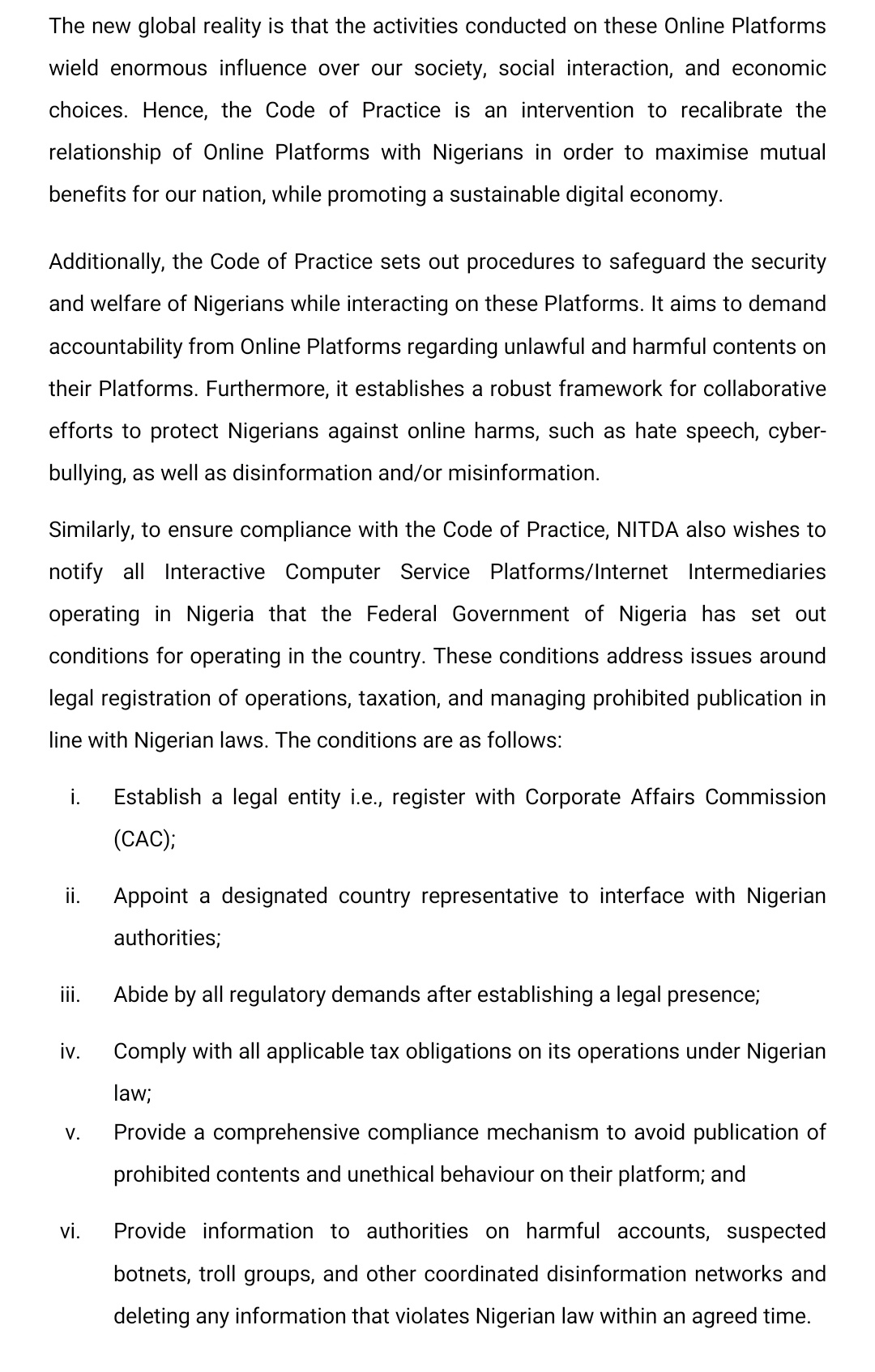The National Information Technology Development Agency (NITDA), an agency charged with standardising, coordinating and developing regulatory frameworks for all Information Technology (IT) practices in the country, has rolled out a ‘Code of Practice’ for online platforms in the country.
NITDA announced that it was presenting the code to the public for further review and contribution, in a statement yesterday.
The agency noted that this was in full compliance to the directive from President Muhammadu Buhari to come up with a code of conduct that would serve as a framework for the operations of all interactive computer service platforms/internet intermediaries in the country.
According to the agency, the code of conduct is aimed at protecting the fundamental human rights of Nigerians and non-Nigerians living in the country, as well as define guidelines for interacting on the digital ecosystem.
Related story: Senate Revives Bill to Regulate Social Media Use, Imposes N150,000 Fine or 3 Years Imprisonment on Offenders
5 things to note about the NITDA ‘Code of Practice’
1. Legal status
According to the NITDA ‘Code of Practice’, going forward, every online platform should endeavour to be registered with the Corporate Affairs Commission (CAC), in order to attain a legal status of operation within the Nigerian space, be it physical or virtual. Also, these platforms are mandated to abide to regulatory demands.
2. A designated country representative
The new NITDA ‘Code of Practice’ also mandates these social media platforms to have a recognised and available representative to liaise and interface with the Government or agencies representing the government as the case may be.
Twitter for example, opened its first African office in Ghana, and has no official presence in Nigeria.
3. Tax compliance
All interactive computer service providers/platforms operating in the country must become tax compliant. That is, they must comply with the available tax obligations and operations under the Nigerian law. As of last year, most of the social media platforms do not pay tax in Nigeria.
As a result, the Minister of Information and Culture, Alhaji Lai Mohammed, while addressing journalists after a Federal Executive Council (FEC) meeting in July last year stated that these social media platforms were making billions of naira in Nigeria without remitting tax to the government, hence, a need to change that.
Whether it is Netflix, Iroko or Facebook…they are all doing business in Nigeria, making money and they are not paying taxes. They are making billions of naira out of this country and they are not paying tax. That cannot be allowed to go on.
Alhaji Lai Mohammed, Minister of Information and Culture
4. Provide mechanism to checkmate information on their platforms
After the events of 2021, which resulted in the suspension of Twitter, in which the Minister of Information stated that the platform was carrying out activities that were dire to the existence of the country, a further reassurance would be for these platforms to ensure that information emanating and circulated are checkmated and verified.
Thus, a mechanism to checkmate unnecessary, prohibited and unethical activities and information is one of the vital points the NITDA ‘Code of Practice’ seeks to correct and ensure.
5. Collaboration on information sharing
The NITDA ‘Code of Practice’ aims to promote collaboration and information sharing on spam, bots, fraudulent accounts which carryout harmful activities and share information that is detrimental to individuals who have access to them and the country at large.

But, there are questions
In 2019, the Nigerian Senate revisited a bill to regulate how Nigerians use social media in the country.
According to Senator Mohammed Sani Musa who sponsored the bill titled ‘Protection from Internet Falsehood and Manipulation’, he claimed that the bill would help checkmate the spread of hate speeches and rumours been perpetrated by social media platforms.
Read also: Africa-made shows, actors, and producers to benefit from Multichoice 2 years investment plan
However, a hearing held by the Senate Committee on Judiciary, Human Rights and Legal Matters saw the proposed Protection from Internet Falsehood and Manipulations Bill, 2019 rejected by representatives of civil society groups, government/private institutions and members of the media who were in attendance.
They claimed the bill was an attempt by government to infringe on the fundamental human rights of Nigerians, which allowed for freedom of expression and public opinion.
Though, the NITDA mentions that the ‘Code of Practice’ was developed in collaboration with the Nigerian Communications Commission (NCC) and the National Broadcasting Commission (NBC), as well as having inputs from various interactive computer service platforms such as Twitter, Facebook, WhatsApp, Instagram, Google, and TikTok amongst others.





